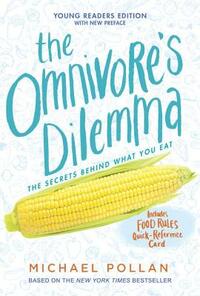Take a photo of a barcode or cover
challenging
informative
inspiring
reflective
medium-paced
Moderate: Animal cruelty, Animal death
took my forever to get through this - here are my takeaways
• corn, in its current state, is bad
• eat local when you can
• pay organic farmers
• rotate plots
• a meal made by hand and shared with good people can heal most wounds
• corn, in its current state, is bad
• eat local when you can
• pay organic farmers
• rotate plots
• a meal made by hand and shared with good people can heal most wounds
Do not read this unless you want your grocery bill to go up exponentially because you refuse to buy products from any animal that is not humanely pasture raised. $6.79 for six guilt free cheese sticks
challenging
informative
reflective
slow-paced
informative
inspiring
slow-paced
adventurous
informative
inspiring
reflective
slow-paced
informative
slow-paced
I would give it 3.5 stars if I could. The Omnivore's Dilemma by Michael Pollan is a complex book that goes into so much detail and off in so many different directions, I had to take several moments to ponder what I read. It's easy to get lost in all the information being presented and Pollan's writing style. I was left to wonder if Pollan ever came back around to finish his original premise. After some reflection, I believe he does.
The industrial section in the beginning was very dry. I know more about corn than I ever wanted to. If you can get through the first 100 pages, taking the facts as they come, the rest of the book is fascinating. I loved the pastoral and hunter/gather sections. Grass farms give me hope! I do wish there had been a bit more history in the last section about human evolution from hunter-gathers to agriculture to today's industry. I have a newfound interest in the mystery of mushrooms. Pollan brings the book full circle in the final chapter, acknowledging where this journey has brought him and his mindset regarding food.
This is a different type of food book than I have been reading lately. Pollan doesn't draw many conclusions and I don't agree with his interpretations of factory farming and why it's ok to consume animals. However, he certainly sheds light on food industry issues that society is facing and how it has come about, without compelling people to be vegetarian. I felt he skirted over most of the animal suffering and pollution problems of factory farms, because he wants to keep eating meat. While it doesn't give the whole picture, it does bring information to those who might be turned off by other books that "convert people to vegetarians".
If you found this review helpful, check out my blog: www.beccaswainfromauburn.wordpress.com. I review a nonfiction and fiction book each week.
The industrial section in the beginning was very dry. I know more about corn than I ever wanted to. If you can get through the first 100 pages, taking the facts as they come, the rest of the book is fascinating. I loved the pastoral and hunter/gather sections. Grass farms give me hope! I do wish there had been a bit more history in the last section about human evolution from hunter-gathers to agriculture to today's industry. I have a newfound interest in the mystery of mushrooms. Pollan brings the book full circle in the final chapter, acknowledging where this journey has brought him and his mindset regarding food.
This is a different type of food book than I have been reading lately. Pollan doesn't draw many conclusions and I don't agree with his interpretations of factory farming and why it's ok to consume animals. However, he certainly sheds light on food industry issues that society is facing and how it has come about, without compelling people to be vegetarian. I felt he skirted over most of the animal suffering and pollution problems of factory farms, because he wants to keep eating meat. While it doesn't give the whole picture, it does bring information to those who might be turned off by other books that "convert people to vegetarians".
If you found this review helpful, check out my blog: www.beccaswainfromauburn.wordpress.com. I review a nonfiction and fiction book each week.
why i haven’t read this book before now is beyond me. 💯
funny
informative
inspiring
fast-paced



